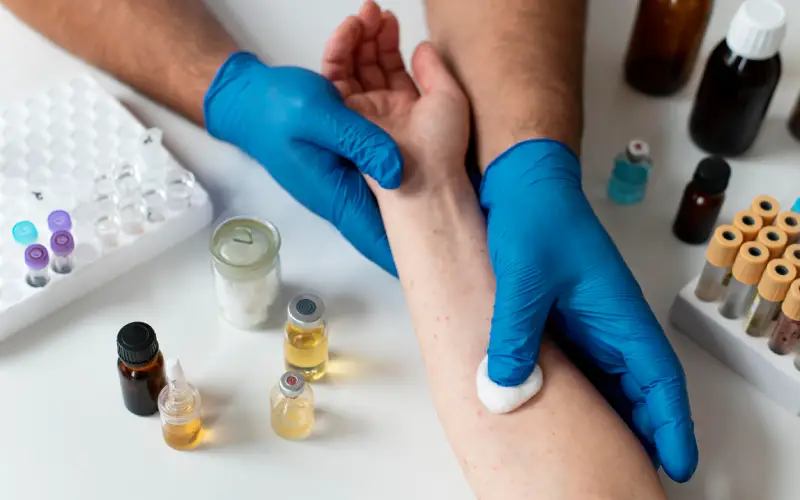Your Path to Allergy-Free Skin

Are you suffering from environmental allergies, food allergies, or insect sting allergies? At Frontier Allergy Asthma and Immunology, our experienced allergy specialist will help you determine what substances trigger your allergy symptoms and work with you to create a comprehensive plan of care. Allergy skin testing is an important tool your allergist may use that will help narrow down your potential allergens.
Anyone who has experienced the symptoms of hay fever (allergic rhinitis), asthma, or dermatitis (eczema) understands how difficult it can be to pinpoint their triggers. However, allergy skin testing has been proven to help patients discover their triggers and start on the path to symptom prevention and management.
Skin tests commonly test for reactions to environmental allergens, such as grass pollens (such as Bermuda or Timothy grass), tree pollens (such as mountain cedar, elm, and oak), weed pollens (such as ragweed), molds, animal danders, dust/dust mites, and cockroach particles. Skin tests can also be used to determine the source of possible food allergies, some medication allergies, and insect stings or bites.
Prior to any scheduled skin test, your allergist will ask you to stop taking all antihistamine and antihistamine-related medications and supplements at least 4 days ahead of your skin test. This is very important to remember as antihistamines and some other types of medications can block any reaction that may occur in response to potential allergens.
There are two types of skin tests that we offer at Frontier Allergy Asthma and Immunology. These include skin prick tests and intradermal skin tests. Your allergist will typically perform a skin prick test first and decide after obtaining results whether to perform an intradermal skin test for additional or more accurate information.
Defining Skin Allergy Tests
A skin allergy test is a term used to refer to several testing procedures used to diagnose allergies. Skin allergy tests are popular because they help diagnose many common allergies, such as hay fever, food allergies etc.
Allergists at Frontier Allergy can help you determine which skin allergy test is best for you.
When do you require allergy skin tests?

If you have any symptoms of an allergy, your healthcare provider may order skin allergy testing. These symptoms can include:
- A stuffy or runny nose
- Sneezing
- Itchy, watery eyes
- Hives or a rash with raised red patches
- Diarrhea
- Vomiting
- Shortness of breath
Types of Skin Allergy Tests
To diagnose allergies, an allergist employs a variety of skin tests. Different tests are better suited for specific conditions or situations. However, food allergies may require additional testing beyond a skin test.
Skin Prick Tests
During a skin prick test, a drop of an allergen extract is applied to the surface of the skin. This is then scratched into the skin using a sterile plastic applicator.
Intradermal Skin Tests
During an intradermal skin test, a small amount of an allergen extract is injected just under the surface of the skin with a small needle. Your allergist will likely perform an intradermal test in the case that an allergen on the skin prick test did not result in a reaction, but they still highly suspect an issue with that substance based on your symptom and medical history. Although research has shown that skin tests are safe for individuals of any age, some circumstances may arise in which your allergist may recommend a different test. This is the case for patients who:
Are infants or very young children who find it difficult receiving multiple pricks on the skin
Have a severe skin condition that may render skin test results inconclusive Cannot discontinue taking certain medications that may interfere with test results Have a history of severe allergic reactions or anaphylaxis that may experience anaphylaxis during the skin test (this will be discussed between you and your allergist during your initial visit)
Patch Test
A skin patch test is the best way to figure out what is causing your contact dermatitis allergies. The process is pretty straightforward - your allergist will stick some standard allergen-containing rectangles onto your back, and then you'll come back in a couple of days, so they can see if you have had any positive reaction. If they suspect you might have a delayed response to something, they'll test you for that too.
Results
Both skin prick tests and intradermal skin tests require observation over a period of 15-20 minutes to check for raised, red, itchy bumps (called wheals). The size of the wheal correlates to your sensitivity to a particular allergen. After reviewing the results of your skin test, your allergist will explain their findings.
At Frontier Allergy Asthma and Immunology, our allergy specialist has years of training and experience and will be happy to answer all questions you may have about the results of your allergy skin test.
In addition, they will create a personalized treatment and management plan that can help prevent and resolve allergic symptoms as they arise.
IYour treatment plan may include lifestyle changes,allergy shots, a medication plan, and possibly immunotherapy.
At Frontier Allergy Asthma and Immunology, our goal is to help you overcome your allergies so that you can live a happier and healthier life.
Why Makes Us Your Ideal Skin Allergist
🗹 Experienced & Board Certified
Our allergy clinic has experienced and board-certified allergists with the expertise to diagnose and treat a wide range of allergies accurately.
🗹 Personalized Plans
We tailor our treatment plans to your needs and preferences, ensuring you receive the most effective care possible.
🗹 Positive Feedback
Our patients consistently praise our compassionate care, accurate diagnoses, and effective treatment plans.
Allergy Testings We Offer
This test involves pricking the skin with a small amount of suspected allergens. It's a common and effective way to identify allergies to substances like pollen, dust mites, and pets.
If you suspect you're allergic to pets, this test can help pinpoint the specific allergen, such as cat dander, dog dander, or other pet-related substances.
A blood test measures the level of antibodies in your blood that react to specific allergens. This test is helpful for those with severe allergies or who cannot undergo skin pricking.
This test involves applying patches containing potential allergens to your skin for some time. It's used to identify contact allergies to substances like metals, cosmetics, and fragrances.
If you have a history of allergic reactions to medications, this test can help determine which drugs you're sensitive to. It's essential for preventing future adverse reactions.
This test identifies allergies to insect venom, such as bees, wasps, or ant venom. It's crucial for individuals who have experienced severe allergic reactions to insect stings.
Frequently Asked Questions
1. How Long Does The Skin Allergy Test Take, And When Can I Expect Results?
- The skin allergy test is a relatively quick procedure that typically takes 15-20 minutes. During the test, pricks are made on your skin, and allergens are applied to each prick. After a short waiting period, our allergists will examine the test sites for reactions.
2. Are There Any Risks Or Side Effects Associated With The Skin Allergy Test?
- The skin allergy test is generally safe, with minimal side effects. While mild discomfort or itching at the test sites can occur, these reactions are usually temporary and resolve quickly.
3. How Accurate Are The Results Of The Skin Allergy Test?
- We use highly accurate methods for diagnosing skin allergies; with our precise techniques and advanced equipment, you can trust that your skin allergy test results will provide valuable insights into your allergies and help you take appropriate steps to manage them effectively.
Next steps
If you are interested in further discussion about your specific needs, Dr. Reshamwala is happy to see you and answer any questions you may have. Please call (512) 535-2655 or email clinic@frontierallergist.com to schedule an appointment today! Book an appointment
Written by: Dr. Neha Reshamwala
NPI number: 1780874578
Page last reviewed: 03/20/21


